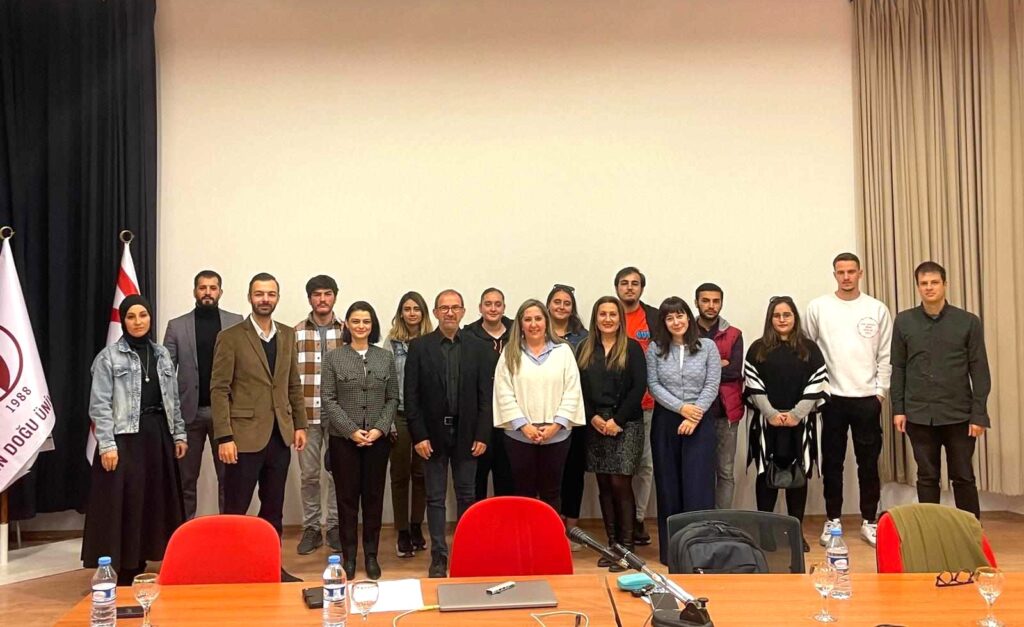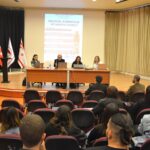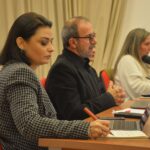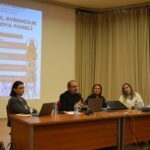
At the panel organized by Near East University Faculty of Communication, Department of Journalism, the subject of “Racism, Discrimination and Media” was discussed by academicians and lawyers. The panel emphasized that unresolved national and international problems lead to the rise of discrimination, and pointed out that the media, and especially social media, trigger discriminatory behavior.
It was moderated by Near East University Faculty of Communication Department of Journalism Assist. Prof. Dr. İbrahim Özejder, and Cyprus Turkish Bar Association Council Member and Human Rights Committee President Lawyer Aslı Murat, Istanbul Doğuş University Communication Sciences Department Head Prof. Dr. Barış Çoban and Head of Political Science Department, Near East University Faculty of Economics and Administrative Sciences head Prof. Dr. Nur Köprülü and Lecturer of the Faculty of Communication, Department of Journalism and Member of the Media Ethics Board Assist Prof. Dr. Özen Çatal took part as a speakers.
The opening speech of the panel held at the Near East University Faculty of Communication Orange Hall was made by Near East University Faculty of Communication Deputy Dean Assoc. Prof. Dr. Ayhan Dolunay. Talking about the international achievements of Near East University, Assoc. Prof. Dr. Dolunay said, “This panel is compatible with the goal of reducing inequalities, especially in the context of UN development goals. It directly coincides with our university’s approach to providing equal opportunities in education and in all fields.”
Assist. Prof. Dr. İbrahim Özejder emphasized that there has recently been a global decline in areas such as human rights, democracy and respect for differences. Özejder further stated that the role of the media in this decline should be questioned. Assoc. Dr. Özejder said that the “Racism, Discrimination and Media” panel would also serve this purpose and handed over the floor to the first speaker of the panel, Lawyer Aslı Murat.
The media still has a way to go!
Lawyer Aslı Murat, Council Member of the Turkish Cypriot Bar Association and Head of the Human Rights Committee, made the first presentation at the panel and touched upon the importance of language and discourse in the media and shared information about the legal regulations in the country regarding hate speech and crime. Murat noted that although there has been some recent progress in legal regulations, there is a need for further expansion and said, “The state should implement policies to prevent discrimination and ensure equality.”
Pointing out that states have negative and positive obligations regarding human rights violations and prohibition of discrimination, Lawyer Aslı Murat emphasized the importance of the state implementing policies to prevent discrimination and ensure equality.
“Discrimination is a situation that we all experience or witness in daily life. Traditional social norms and uniform and homogeneous political attitudes are triggers for victimization,” said Murat, touching on the concept of equality as well as discrimination. Lawyer Aslı Murat also pointed out that hate speech in the media also legitimizes discrimination and emphasized that the language used should not create the perception that “they deserve it”.
Stating that there has been an improvement in discriminatory language and marginalization in the media in recent years, Murat concluded her words by saying, “We are in a much better situation than in the past, we still have a way to go when it comes to reporting issues of gender-based violence, xenophobia, suspect and defendant rights.”
The stereotypical language used in the media reproduces judgments!
Near East University Faculty of Communication Lecturer and Media Ethics Board Member Assist. Prof. Dr. Özen Çatal gave information about the work carried out by the Media Ethics Board in the context of racism and discrimination. Giving examples from the country’s media, Assist Prof. Dr. Çatal emphasized that the language used in the media can cause discrimination to take hold by reproducing some stereotypes in society.
Near East University Faculty of Economics and Administrative Sciences Head of Political Science Department Prof. Dr. Nur Köprülü, on the other hand, discussed the issue from the perspective of politics and system and pointed out the basic dynamics in the emergence of far-right and populist politics that have risen in Europe in recent years. Touching on the political, economic and cultural reasons for the increasing vote rate of populist parties in Europe in recent years, Prof. Dr. Köprülü said, “The structure described as the international community, including diplomacy, should be made more effective.”
Social media is rapidly spreading racist and discriminatory thoughts!
Head of Department of Communication Sciences at Istanbul Doğuş University, Prof.Dr. Barış Çoban, who connected to the panel online, touched upon the role of social media in the rapid spread of discriminatory discourses. Emphasizing that social media has a much stronger interaction than traditional media, Prof. Dr. Çoban said, “The fact that social media is interaction-based and has a rapid effect on mobilization makes it easier for racist/discriminatory thoughts to spread rapidly and be put into action. Racist/discriminatory social media accounts use stereotyping through hate speech, online microaggressions, and harassment. In addition, it is possible for social media algorithms to strengthen racist/discriminatory prejudices and ultimately turn them into political manipulation material.”
On the other hand, Prof. Dr. Çoban said that communities that have been marginalized and targeted by racist/discriminatory attacks also have the opportunity to express themselves by using alternative social media channels. Prof. Dr. Barış Çoban said, “The production of content and events that question and break down prejudices and stereotypes, as well as the development of inclusive, sharing approaches through online/offline campaigns, are extremely important in terms of creating a polyphonic and democratic social space.”



